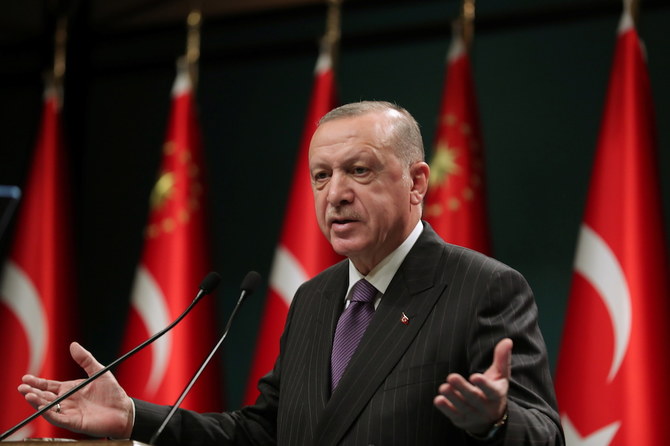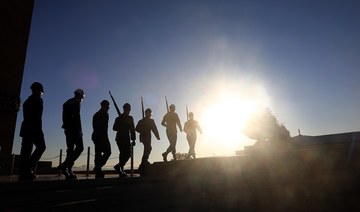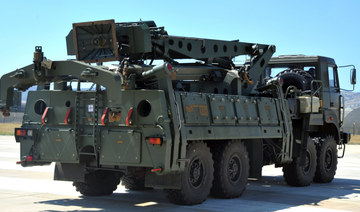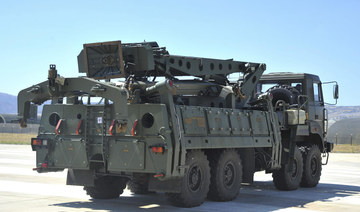WASHINGTON: The Trump administration on Monday imposed sanctions on its NATO ally Turkey over its purchase of a Russian air defense system, setting the stage for further confrontation between the two nations as President-elect Joe Biden prepares to take office.
The move comes at a delicate time in relations between Washington and Ankara, which have been at odds for more than a year over Turkey’s acquisition from Russia of the S-400 missile defense system, along with Turkish actions in Syria, the conflict between Armenia and Azerbaijan and in the eastern Mediterranean.
The US had previously kicked Turkey out of its F-35 stealth fighter development and training program over the purchase, but had taken no further steps despite persistent warnings from American officials who have long complained about the purchase of the S-400, which they say is incompatible with NATO equipment and a potential threat to allied security.
“The United States made clear to Turkey at the highest levels and on numerous occasions that its purchase of the S-400 system would endanger the security of US military technology and personnel and provide substantial funds to Russia’s defense sector, as well as Russian access to the Turkish armed forces and defense industry,” Secretary of State Mike Pompeo said.
“Turkey nevertheless decided to move ahead with the procurement and testing of the S-400, despite the availability of alternative, NATO-interoperable systems to meet its defense requirements,” he said in a statement.
“I urge Turkey to resolve the S-400 problem immediately in coordination with the United States,” he said. “Turkey is a valued Ally and an important regional security partner for the United States, and we seek to continue our decades-long history of productive defense-sector cooperation by removing the obstacle of Turkey’s S-400 possession as soon as possible.”
The sanctions target Turkey’s Presidency of Defense Industries, the country's military procurement agency, its chief Ismail Demir and three other senior officials. The penalties block any assets the four officials may have in US jurisdictions and bar their entry into the US. They also include a ban on most export licenses, loans and credits to the agency.
The administration had held off on imposing punitive sanctions outside of the fighter program for months, in part to give Turkish officials time to reconsider deploying it and, some suspect, due to President Donald Trump's personal relationship with Turkish leader Recep Tayyip Erdogan.
However, in past months Turkey has moved ahead with testing of the system drawing criticism from Congress and others who have demanded the sanctions be imposed under the Countering America’s Adversaries Through Sanctions Act, or CAATSA, which mandates penalties for transactions deemed harmful to US interests.
Coming just a month and-a-half before Biden assumes office, the sanctions pose a potential dilemma for the incoming administration, although the president-elect's team has signaled it is opposed to Turkey's use of the S-400 and the disunity within NATO it may cause.
Last month, Turkish Defense Minister Hulusi Akar said Turkey was prepared to discuss with the US its “anxiety” over the interoperability of the S-400s and the F-35s. The US reacted cooly to the suggestion and Pompeo shortly thereafter pointedly did not meet with any Turkish government officials on a visit to Istanbul.
Turkey tested the missile defense system in October for the first time, drawing a condemnation from the Pentagon.
Ankara says it was forced to buy the Russian system because the US refused to sell it American-made Patriot missiles. The Turkish government has also pointed to what it considers a double standard, as NATO member Greece uses Russian-made missiles.
US sanctions NATO ally Turkey over Russian missile defense system
https://arab.news/mbeja
US sanctions NATO ally Turkey over Russian missile defense system

- The move comes at a delicate time in relations between Washington and Ankara
- US had previously kicked Turkey out of its F-35 stealth fighter development and training program over the purchase
Displaced Lebanese return to southern border to mourn, pray over Eid

- Israel and Hezbollah have traded near-daily cross-border fire since Hamas’ Oct. 7 attack
NAQURA, Lebanon: Some displaced residents of southern Lebanon returned Monday to their towns for a key Muslim holiday to pray and mourn loved ones killed in months of cross-border violence between Israel and Hezbollah.
“Today is Eid Al-Adha, but it’s completely different this year,” said teacher Rabab Yazbek, 44, at a cemetery in the coastal town of Naqura, from which many residents have fled.
Every family has lost someone, “whether a relative, friend or neighbor,” Yazbek said, adding that two people she had taught had been killed.
Israel and Hezbollah, a powerful Lebanese movement allied with Hamas, have traded near-daily cross-border fire since the Palestinian militant group’s October 7 attack on Israel which triggered war in the Gaza Strip.
The violence has killed at least 473 people in Lebanon, most of them fighters but also including 92 civilians, according to an AFP tally.
Israeli authorities say at least 15 soldiers and 11 civilians have been killed in the country’s north.
At the cemetery, women in black chadors consoled each other at the shiny new graves adorned with flowers and large pictures of the dead, including Hezbollah fighters.
The Naqura municipality said it had coordinated with the Lebanese army so that residents could safely visit the cemetery and mosque for two hours for Eid Al-Adha, which for many Shiite Muslims in Lebanon began on Monday.
Residents reportedly returned to a number of south Lebanon border villages on Monday morning as part of similar initiatives.
Yellow Hezbollah flags and green ones belonging to the group’s ally the Amal movement flew at the recently established cemetery near the sea, located just a stone’s throw from the United Nations peacekeepers’ headquarters.
Lebanese soldiers accompanied the residents as they entered the town.
The army coordinates with the UN peacekeepers, who in turn communicate with the Israeli side as part of efforts to maintain calm.
In Naqura, a damaged sign reading “thank you for your visit” lay along the highway.
Amid the concrete rubble and twisted metal of one building, the shattered glass of a family photo lay scattered on the ground.
Nearby, potted plants hung from the veranda rails of another devastated structure, with a pink child’s toy car among the debris.
Rawand Yazbek, 50, was inspecting her clothing shop, whose glass store front had been destroyed, though the rest remained largely intact.
“A thousand thanks to God,” she said, grateful that not all was lost.
“As you can see... our stores are full of goods,” she said, pointing to shelves and racks of colorful clothes.
Hezbollah stepped up attacks against northern Israel last week after an Israeli strike killed a senior commander from the movement.
The Iran-backed group has not claimed any attacks since Saturday afternoon.
Lebanese official media reported Israeli bombardment in the country’s south over the weekend, as well as a deadly strike on Monday. Hezbollah said later that one of its fighters had been killed.
Like other residents who support the Hezbollah and Amal movements, Naqura municipality head Abbas Awada called attacks on the town “cowardly.”
Last week, a strike there blamed on Israel killed an employee of the area’s public water company.
More than 95,000 people in Lebanon have been displaced by the hostilities, according to the UN’s International Organization for Migration.
Tens of thousands have also been displaced on the Israeli side of the frontier.
Hezbollah lawmaker Hassan Ezzedine, among a large crowd that attended prayers at the Naqura mosque, said the turnout was a message that “this land is ours, we will not leave it.”
“We support this resistance (Hezbollah) because it’s what protects us, it’s what defends us,” he said.
Palestinian Authority at risk of collapse, Norway says

- Norway chairs the international donor group to the Palestinians and is a backer of the Palestinian Authority
OSLO: The Palestinian Authority could collapse in the coming months, Norwegian Foreign Minister Espen Barth Eide said on Monday, citing a lack of funding, continuing violence and the fact that half a million Palestinians are not allowed to work in Israel.
“The Palestinian Authority, with whom we work closely, are warning us that they might be collapsing this summer,” Barth Eide said.
Norway chairs the international donor group to the Palestinians and is a backer of the PA.
Jordan braces for scorching heatwave as temperatures soar

- The Gulf of Aqaba reached highs of 45 celsius
- Temperatures in Jordan are set to rise slightly, with the heatwave persisting
AMMAN: The Jordan Meteorological Department forecast extreme heat for Monday, with most regions of the country — particularly the desert areas, Jordan Valley, Dead Sea and Aqaba — experiencing intense temperatures.
The Gulf of Aqaba reached highs of 45 celsius, the Southern Jordan Valley 44 celsius, Dead Sea 43 celsius, while the Desert Regions and the Northern Jordan Valley reached highs of 41 celsius.
Cloud cover at medium and high altitudes is expected in the south and east of the Kingdom, state news agency Petra reported, with moderate northwesterly winds occasionally becoming brisk.
The JMD cautioned people against prolonged sun exposure, which could lead to dehydration, especially for vulnerable groups such as the elderly and those with health conditions. It also highlighted the risk of forest fires and the dangers of leaving children or flammable items, like perfumes and sanitizers, inside vehicles.
Looking ahead to Tuesday, temperatures in Jordan are set to rise slightly, with the heatwave persisting. Most areas will remain hot, the JMD said, and desert regions will face sweltering conditions. Northeasterly winds will prevail, shifting to moderate northwesterly by evening.
The heatwave will continue into Wednesday, with another slight increase in temperatures. Conditions will be blistering and dry across the highlands, the JMD warned, with extreme heat persisting elsewhere. Northeasterly winds will turn to moderate northwesterly later in the day.
Thursday will bring a modest reprieve as temperatures dip slightly. However, the weather will remain hot across most areas, with the desert, Jordan Valley, Dead Sea, and Aqaba continuing to sizzle. Moderate northwesterly winds will occasionally become brisk.
Iran calls for joint action by Islamic nations to stop Gaza war

- Israel’s military offensive on Gaza has killed at least 37,337 people so far
TEHRAN: Iran’s Acting Foreign Minister Ali Bagheri Kani has called for joint action on the part of Islamic countries to pressure Israel into ending its brutal military activities in Gaza, which have devastated most of the enclave and killed thousands of Palestinians there.
Israel’s military offensive on Gaza has killed at least 37,337 people, mostly civilian women and children, since the Oct. 7 Hamas attack, according to the Hamas-run Health Ministry in Gaza.
Humanitarian supplies for millions of Palestinians displaced by the conflict have been squeezed despite the Israeli military declaring it would “pause” fighting daily around a southern route to facilitate aid flows.
The Iranian official also spoke with his Afghan counterpart Amir Khan Muttaqi via telephone on Sunday, with the two discussing bilateral relations as well as the situation in war-ravaged Gaza.
Kani reiterated Iran’s readiness to help Kabul resolve its challenges and achieve growth, Iran’s news agency IRNA reported.
Kuwaiti citizen detained for alleged involvement in extremist group

KUWAIT CITY: The Public Prosecution in Kuwait has ordered the detention of a citizen on charges of joining a group aimed at illegally undermining the country’s basic systems, state news agency KUNA reported on Sunday.
The individual is also accused of receiving training in making explosives and preparing poisons for illicit purposes, as well as planning to leave the country to fight with the group, though he was unable to do so.
The Public Prosecution interrogated the accused and presented him with the charges, according to a statement released on its official account on X. Investigation procedures are ongoing.



















